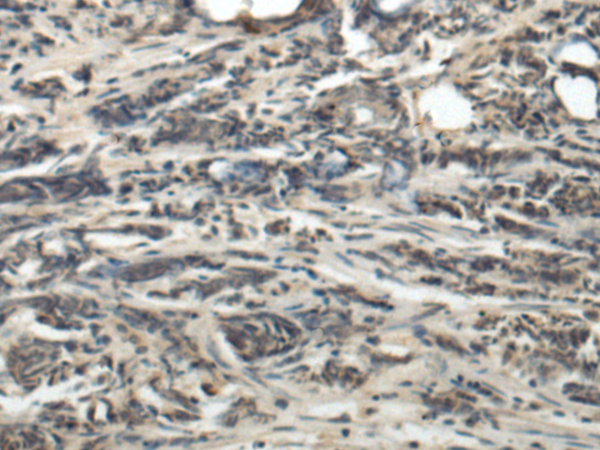
| WB | 咨询技术 | Human,Mouse,Rat |
| IF | 咨询技术 | Human,Mouse,Rat |
| IHC | 1/100-1/200 | Human,Mouse,Rat |
| ICC | 技术咨询 | Human,Mouse,Rat |
| FCM | 咨询技术 | Human,Mouse,Rat |
| Elisa | 1/5000-1/10000 | Human,Mouse,Rat |
| Aliases | AILIM; CD278; CVID1 |
| Host/Isotype | Rabbit IgG |
| Antibody Type | Primary antibody |
| Storage | Store at 4°C short term. Aliquot and store at -20°C long term. Avoid freeze/thaw cycles. |
| Species Reactivity | Human |
| Immunogen | Fusion protein of human ICOS |
| Formulation | Purified antibody in PBS with 0.05% sodium azide and 50% glycerol. |
+ +
以下是关于ICOS抗体的3篇代表性文献,涵盖其治疗应用及机制研究:
---
1. **文献名称**:*ICOS agonism by JTX-2011 (vopratelimab) enhances antitumor responses by promoting CD8+ T cell activation and memory formation*
**作者**:Campbell JR, et al.
**摘要**:该研究报道了ICOS激动型抗体JTX-2011(vopratelimab)在临床前模型中的作用机制,显示其通过激活CD8+ T细胞并促进记忆T细胞分化,增强抗肿瘤免疫应答。联合PD-1抑制剂可显著抑制肿瘤生长,支持其在实体瘤治疗中的潜力。
---
2. **文献名称**:*Targeting ICOS in cancer: Preclinical evidence and clinical development of ICOS agonistic antibodies*
**作者**:Solinas C, et al.
**摘要**:综述了ICOS在肿瘤微环境中的调控作用,总结了ICOS激动型抗体(如GSK3359609)的临床前数据及早期临床试验结果。强调ICOS激活可增强T细胞功能,并与免疫检查点抑制剂协同增效,但需关注剂量相关的自身免疫毒性风险。
---
3. **文献名称**:*ICOS expression on tumor-infiltrating T cells identifies immunologically active head and neck cancers*
**作者**:Duhen R, et al.
**摘要**:研究发现头颈癌患者肿瘤浸润T细胞中高表达ICOS,提示其可作为免疫治疗响应的生物标志物。使用抗ICOS抗体可进一步激活T细胞功能,为ICOS靶向治疗在该癌种中的应用提供依据。
---
**备注**:上述文献均为近年研究(2019-2022),聚焦ICOS抗体在肿瘤免疫治疗中的机制探索与临床转化。若需具体期刊或补充文献,可进一步说明研究方向(如自身免疫疾病、抗体工程等)。
The ICOS (Inducible T-cell CO-Stimulator) antibody targets a key immune checkpoint protein belonging to the CD28/CTLA-4 receptor family. Expressed primarily on activated T-cells, ICOS interacts with its ligand (ICOSL) on antigen-presenting cells, enhancing T-cell activation, proliferation, and cytokine production. Unlike CD28. ICOS is induced after T-cell receptor stimulation, playing a critical role in sustaining immune responses, particularly in follicular helper T (Tfh) cells and regulatory T (Treg) cells.
In therapeutic contexts, ICOS antibodies are explored for modulating immune activity. Agonist antibodies (e.g., targeting ICOS to boost T-cell function) show potential in cancer immunotherapy, enhancing anti-tumor responses. Conversely, antagonist antibodies may suppress autoimmune or inflammatory diseases by inhibiting ICOS-mediated pathways. Recent studies highlight ICOS's dual role: promoting effector T-cell responses while sustaining immunosuppressive Tregs, depending on disease context.
Clinical trials are evaluating ICOS-targeting agents, often combined with PD-1/CTLA-4 inhibitors, to optimize efficacy. Challenges include balancing immune activation with toxicity risks. Research continues to unravel ICOS signaling nuances, aiming to refine therapeutic strategies for cancers, autoimmune disorders, and chronic infections. Its unique position in immune regulation makes ICOS a promising yet complex target for precision immunotherapy.
×